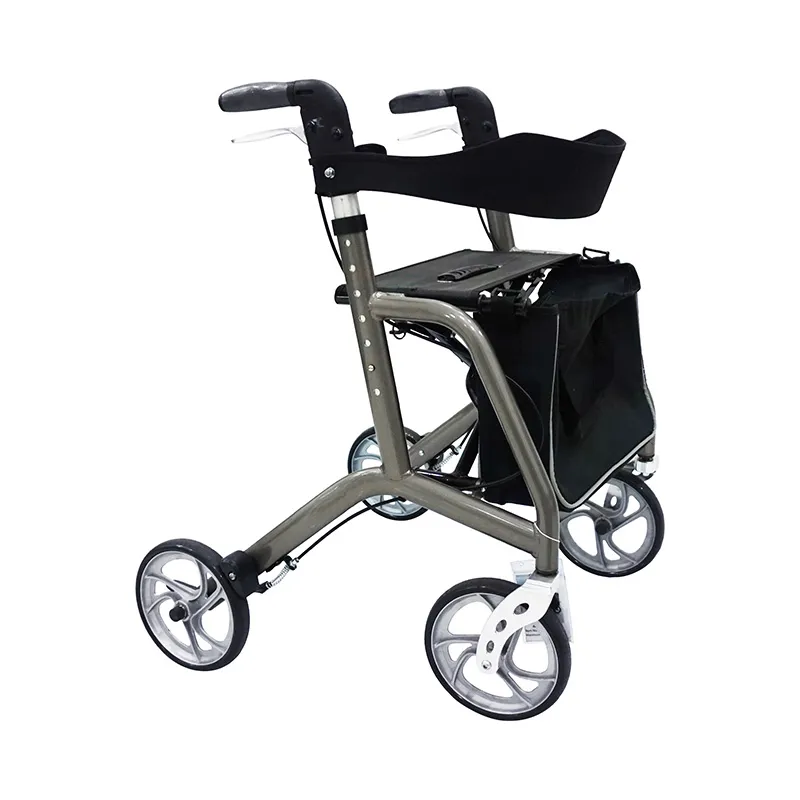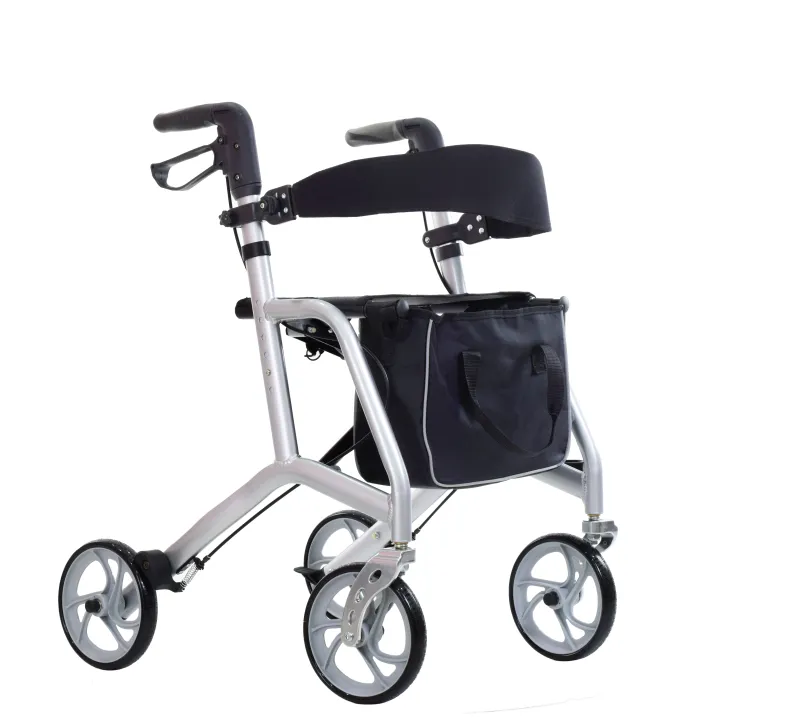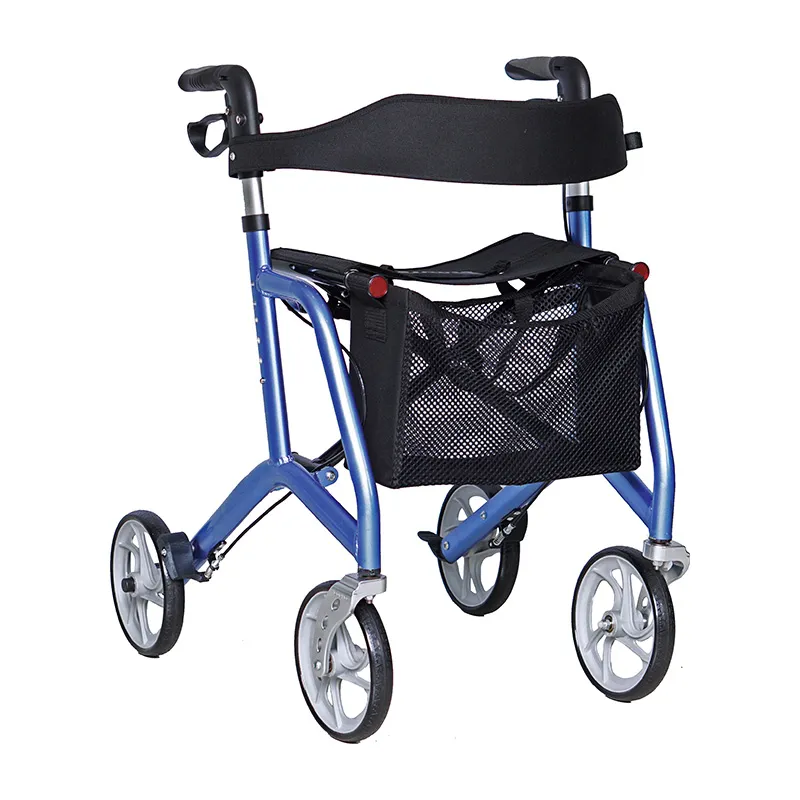
Why are the elderly reluctant to use rollator walkers?
2024-09-25 15:30
In modern society, more and more elderly people are facing mobility problems. As a common assisted walking device, rollator walkers can provide stable support and convenience for the elderly.
However, many elderly people are reluctant to use this device. This article will analyze in depth the reasons why the elderly are reluctant to use rollator walkers and explore the role of self-esteem in this.

What are the advantages of rollator walkers?
A rollator walker is a walking aid equipped with four wheels, a handbrake and a seat, designed to provide support and convenience for people with limited mobility. Its main advantages include:
● Strong stability: The four-wheel design provides good stability and reduces the risk of falling.
● Easy to move: Users can easily push the rollator walker and reduce physical exertion.
● Rest function: The built-in seat allows users to rest at any time during walking.
● Convenient to carry items: Most rollator walkers are equipped with baskets or bags for easy carrying of personal items.
Despite the many advantages of rollator walkers, the use rate of elderly people is not high. The following will explore the reasons behind this phenomenon in detail.
Why are the elderly reluctant to use rollator walkers?
Reasons why the elderly are reluctant to use rollator walkers:
● The influence of self-esteem
● Cultural and social factors
● Psychological and emotional factors
● Problems in actual use

● The influence of self-esteem:
The definition and role of self-esteem:
Self-esteem is the perception and evaluation of an individual's own value, and is an important part of personal mental health. For the elderly, self-esteem plays an important role in daily life and affects their behavior and decision-making.
The impact of using a rollator walker on self-esteem:
The elderly may think that using a rollator walker is a symbol of denial and dependence on their own mobility. This perception will damage their self-esteem, make them feel incompetent and dependent on others, and then develop a resistance mentality.
Social identity and self-identity:
When using a rollator walker, the elderly may worry about being seen as "disabled" or "weak" by others, which is inconsistent with the self-image they want to maintain. This conflict between social identity and self-identity will further aggravate their resistance to using a rollator walker.
● Cultural and social factors
Social stereotypes:
In many cultures, the use of assistive walking devices is often associated with the elderly, the weak, the sick and the disabled. These social stereotypes make the elderly worry that using a rollator walker will be seen as frail by others, which in turn affects their social status and interpersonal relationships.
Family and community influence:
The attitudes of family members and the community towards the use of rollator walkers by the elderly will also affect the elderly's choice. If family members or the community have a negative attitude towards the use of assistive devices, the elderly may choose not to use a rollator walker to avoid conflict and maintain family harmony.
● Psychological and emotional factors
Self-efficacy:
Self-efficacy refers to an individual's belief in their ability to complete a task or cope with a situation. The elderly may think that using a rollator walker means that they have lost their sense of self-efficacy and cannot complete daily activities independently, and this cognition will lead them to refuse to use a rollator walker.
Adaptation and acceptance:
The elderly need time and psychological preparation to adapt to changes in physical function and accept new assistive devices. Some elderly people may not have fully accepted their reduced mobility, so they resist using a rollator walker.
● Problems in actual use
Equipment selection and adaptation:
Not all rollator walkers are suitable for every elderly person. Improper selection or use of an inappropriate rollator walker may lead to a poor user experience, which in turn increases the possibility of elderly people refusing to use it. When choosing a rollator walker, the elderly need to consider factors such as its height, weight, wheel size, and the sensitivity of the handbrake.
Limitations of the use environment:
The rollator walker has different effects in different environments. The elderly may find that the rollator walker is inconvenient to use in narrow indoor spaces or uneven outdoor surfaces. These practical problems will reduce their acceptance of the rollator walker.

How to improve the acceptance of the rollator walker among the elderly?
Raise awareness and education:
Through community publicity and education, improve the elderly's awareness of the rollator walker, make them understand its functions and advantages, and eliminate the psychological barriers to using the rollator walker. Lectures, experience activities, and sharing of success stories can be used to help the elderly and their families better understand the value of the use of the rollator walker.
Personalized selection and trial:
Provide personalized equipment selection and trial services to help the elderly find the rollator walker that suits them best. Professional evaluation and guidance can ensure that every elderly person can choose a device with the right height, weight, and function.
Improve the use environment:
Improve the obstacles in the living environment of the elderly to make the rollator walker more convenient in daily use. For example, install barrier-free facilities at home, level the ground, and ensure that the indoor space is spacious enough for the smooth use of the rollator walker.
Social support and encouragement:
Encourage family members and the community to give more understanding and support to the use of the rollator walker by the elderly. Through positive social interaction and emotional support, help the elderly overcome the psychological barriers to using the rollator walker and enhance their self-esteem and self-efficacy.








